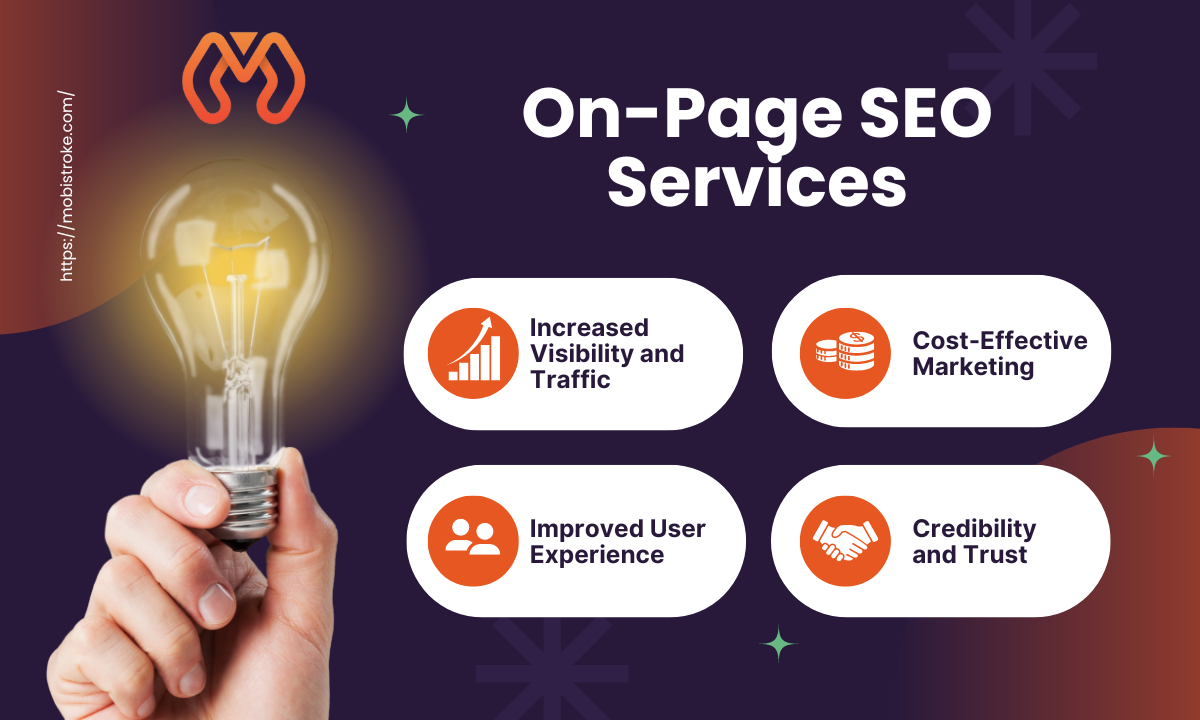
If your company has a website, you probably already know and comprehend the fundamentals of SEO. However, are you aware of on-page SEO and how to leverage on-site optimizations to increase your search engine presence?
What is Search engine optimisation (SEO)?
Search engine optimization (SEO) known as “on-page SEO” employs on-site improvements to raise a page’s placement in pertinent search results. On-site optimizations focus on the source code and content of a page. It entails the subsequent:
Content creation and optimization with user intent in mind, enhancing page speed, incorporating keywords into your content, and more.
On page SEO vs Off page SEO
The two types of SEO criteria that on-page and off-page SEO target are distinct from one another. While the latter focuses on elements outside of a page, the first one concentrates on how SEO factors occur on a page.
One reason your page could not be ranking in the top 10 is because it might not include the information people are looking for. You must contrast the subjects covered by highly ranked pages with those covered by you in order to determine whether that is the case.
The Content Gap tool from Ahrefs might help you automate this procedure. This tool displays keywords that you don’t rank for but target pages do.
One of the most crucial ranking elements is backlinks (more on this later). In addition to “building” them, you can also get them naturally.
There are numerous strategies for developing links. To obtain links from the same websites, one of them searches for patterns of linking among your rivals. You’ll need a backlink checking tool for that.
The greatest strategy to see linking trends is to find websites that link to your competitors but not to you, as links from new websites (i.e., sites that don’t link to you yet) are likely to move the ranking needle the most. This is readily accomplished with Ahrefs’ Link Intersect tool.
What is an On Page SEO analyst or specialist?
Improving a website’s organic rankings is the main objective of an SEO specialist.
This book will offer solutions whether your goal is to become an SEO specialist yourself or work for an organization that is hiring.
To enhance organic search results, SEO specialists also known as SEOs, or search engine optimizers use a variety of techniques, including technical audits, content production, link building, and keyword research. Their responsibility is to find search-related methods and approaches that increase leads and profits for your company.
Other positions with substantial SEO expertise and experience include SEO professionals and managers. Professionals at the entry- to mid-levels who are honing their skills are SEO specialists.
Advantages of Becoming an Expert in SEO
SEO is a profitable and in-demand industry. 53% of all site traffic, according to BrightEdge, originates from organic search. Furthermore, almost 70% of internet marketers believe that SEO generates leads more effectively than PPC (pay-per-click).
According to a 2022 B2B marketing survey, 49% of participants employ SEO strategies at their organizations, and in 2023, CMOs and senior executives intended to devote 23.5% of their marketing budgets on SEO.
Due to businesses spending money on organic search traffic to create leads, SEO consultants are in great demand.
Comparing SEO to other forms of digital marketing, such PPC advertising or social media marketing, shows how much less expensive and difficult it is to get started.
To lay a strong basis for more advanced SEO training, aspiring SEO specialists might begin by enrolling in a basic SEO certification course like Greg Gifford’s SEO Fundamentals course through Semrush Academy.
Read more: Digital Marketing For Enterprise Companies
The majority of SEO jobs involve regular duties like:
Carrying out keyword research to find the terms and expressions that people are using to look for the company.
Examining factors such your backlink profile, website crawlability, on-page SEO, and user experience when auditing the architecture and layout of your website to increase usability and organic rankings.
Looking at methods for building relationships with other websites and organizations in order to obtain backlinks.
Write intriguing title tags and meta descriptions that encapsulate the content that readers can anticipate.
Utilizing HTML tags, canonical tags, alt text, and other optimization techniques to improve the content understanding of websites for both users and search engines.
Enhancing accessibility to make your website easier to navigate for those using screen readers and for users to comprehend.

